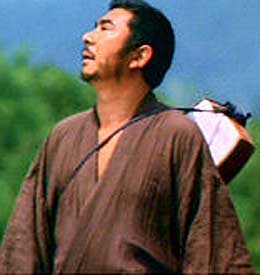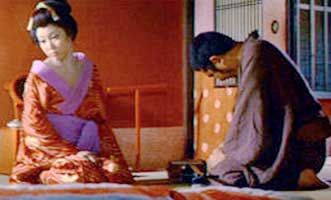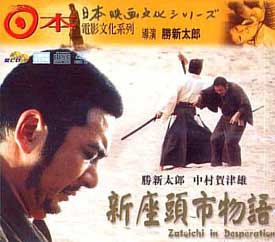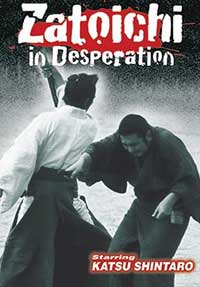One of the gloomiest of all Zatoichi feature films, Ichi's desire to assist the helpless results in no happy outcomes for anyone.
 For Asian action fans who prefer whopping flying kung-fu screamers or hopping teenage ninjas, this is going to be a disappointment. But for those of us who prefer a serious film wherein the violence & bloodshed have a severe & sorrowful context, Zatoichi in Desperation (Shin Zatoichi monogatari, 1972) pushes the limits of the downbeat. For Asian action fans who prefer whopping flying kung-fu screamers or hopping teenage ninjas, this is going to be a disappointment. But for those of us who prefer a serious film wherein the violence & bloodshed have a severe & sorrowful context, Zatoichi in Desperation (Shin Zatoichi monogatari, 1972) pushes the limits of the downbeat.
The story begins with Ichi himself accidentally killing someone innocent through incompetence. He met a shamisen-playing old woman on a bridge & due to his blindness caused her to fall to her death. Knowing only the town & bordello name of the old woman's granddaughter Nishikigi (Kiwako Taichi), Ichi sets out to bring Nobu's shamisen to her granddaughter.
Zatoichi in Desperation was Katsu-shin's directorial debut. He obtained such superior art direction that the film makes him seem like an old hand at creating visual beauty. In a series already famed for pictorial excellence, this one's compositionally top of the list.
 A group of five yakuza are preparing to attack Ichi. When the gambler blocking his way will not say what he's after, Ichi says with dark jest, "I'm blind & you're mute. I guess we're not going to get along." And then four remained. A group of five yakuza are preparing to attack Ichi. When the gambler blocking his way will not say what he's after, Ichi says with dark jest, "I'm blind & you're mute. I guess we're not going to get along." And then four remained.
He comes to a town where everyone is despairing for various reasons, mostly to do with the overbearing yakuza victimizing, indebting, prostituting, & killing the forlorn, without fear of reprisal. Gangster interests are most especially terrorizing fishermen in order to take possession of boats & monopolize the fishing industry.
The overall disgusting nature of the local yakuza is more intense than the average for such films, highlighted by a scene in which they whack off the village idiot, then beat him for squirting sperm at them.
As Ichi connects with the gambling underworld, he intends to win enough to buy the orphaned prostitute Nishikigi (Kiwako Taichi) out of her bordello contract, mainly to make amends for causing the death of her grandmother.
Ichi does his "one die outside the basket" scam which is a classic "you can't cheat an honest man" routine. Pretending to be a novice gambler, & obviously blind, he begs to toss the dice himself. He throws the dice in the basket then flips it onto the gambling mat, except there is one die outside the basket. Everyone bets on the sure odds implied by the visible die. But Ichi pretends to have just realized one of his own dice fell out of his sleeve-pocket, & there really are two dice under the basket. No one dares suggest Ichi cheated without admitting they were betting on the visible die, so he gathers up his winnings.
The yakuza boss Kagiya Mangoro (Koike Asao) is not a happy loser. He has a yojimbo (samurai bodyguard) named Kamijo (Joji Takagi) & offers him a hundred ryo to kill Ichi.
 Nishikigi is redeemed by Ichi. She had long resigned herself to a demeaning life & had made the most of it. The look of shock when Ichi tears up her indenture papers is truly touching. Nishikigi is redeemed by Ichi. She had long resigned herself to a demeaning life & had made the most of it. The look of shock when Ichi tears up her indenture papers is truly touching.
Another story has been unfolding within the larger tapestry of interwoven lives. Kaede (Kyoko Yoshizawa), a fourteen year old girl, cares for her baby brother Shinkichi (). She had been indentured to a household as a servant for three years.
Though maltreated as a maid, she strives her best, & takes heart that her three year term of service has almost expired. Unfortunately, the old madame of the house (Masumi Harukana) has no intent of ever setting Kaede free, having instead planned to sell her virginity to a corrupt magistrate, the dandified Tokujiro (Yoshihiko Aoyama), who lusts to deflower under-aged virgins.
Little Shinkichi is a rambunctious child with a decided sense of injustice. His rebellious nature induces him to chuck a pebble at the gangster boss Kagiya, which gets him severely beaten & left on the beach near death. The yojimbo is unleashed when fishermen try to intervene.
Kaede was locked up & held captive until she could be sold into prostitution. Though she escapes, her story nevertheless ends on a note of deepest tragedy.
 A typical action scene with Zatoichi has him warning the yakuza who gather around him with their weapons, "You won't have much of a future if you're dead." They do not heed the warning, & the ronin yakuza is nearby watches as Ichi's flashing sword instantly slays four men. A typical action scene with Zatoichi has him warning the yakuza who gather around him with their weapons, "You won't have much of a future if you're dead." They do not heed the warning, & the ronin yakuza is nearby watches as Ichi's flashing sword instantly slays four men.
There'll later be a carnage-packed one-against-all duel in a lightning storm with special attention given to Ichi's only gifted challenger, Kamijo the yojimbo.
Ichi has met a young gambler, Ushi (played by Kazuo Nakamura, real-life brother Kinnosuke Yorozuya). He's one of those roguish types who could be a good guy but is dimwittedly eager to rise in the yakuza world so ends up doing great wrong. He loves Nishikigi & has been assured she will be given to him if he can kill Ichi.
There's another 50 ryo in it if Ushi can talk Nishikigi into helping do it. They conspire to disarm Ichi because, "He can't hike his way to hell without his cane." Ichi permits Ushi to pierce both Ichi's hands with the canesword, then Ushi returns the weapon.
Ichi binds the sword to his wrist since he can't hold it with his injured hands. Being a film about despair, Ushi's reward will be vastly less than he expected, & Nishikigi will have betrayed Ichi without the least benefit to herself or her lover.
Evil boss Mangoro is awfully sure of himself after Ichi's hands are pierced. Ichi's so pitiful, yet proves still to be unimaginably powerful. He rises up, a horrifically injured menace, & there's a certain dawning on Mongoro's face as he cries out to his minions, "Kill that bakemono!" meaning Ichi is a "monster."
With canesword tied to his hand & wrist by blood-drenched bandages, he stalks boss Mangoro like a merciless Buddha out of Hell. This amazing capacity for actor Shintaro Katsu to go from a charming warmhearted guy to a monstrously hulking scowling avenger is just one reason Zatoichi is such an immortal character. Ichi's character had become slightly parodic in some of the last feature episodes & Zatoichi in Desperation restored the sorrowful grittiness of the earliest episodes.
The relentless tragedy of this episode will not be to everyone's liking, but now & then it seems a good thing to show that violence is rarely an effective reply to injustice, but just one more element of the sadness of existence.
copyright © by Paghat the Ratgirl
|

 For Asian action fans who prefer whopping flying kung-fu screamers or hopping teenage ninjas, this is going to be a disappointment. But for those of us who prefer a serious film wherein the violence & bloodshed have a severe & sorrowful context, Zatoichi in Desperation (Shin Zatoichi monogatari, 1972) pushes the limits of the downbeat.
For Asian action fans who prefer whopping flying kung-fu screamers or hopping teenage ninjas, this is going to be a disappointment. But for those of us who prefer a serious film wherein the violence & bloodshed have a severe & sorrowful context, Zatoichi in Desperation (Shin Zatoichi monogatari, 1972) pushes the limits of the downbeat.

